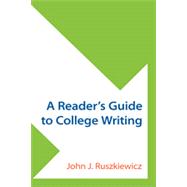Get the insider view on how critical reading really works and can help you as a Reader's Guide to College Writing teaches you how to engage with ideas while growing as a successful academic writer.

Note: Supplemental materials are not guaranteed with Rental or Used book purchases.
Purchase Benefits
What is included with this book?
Get the insider view on how critical reading really works and can help you as a Reader's Guide to College Writing teaches you how to engage with ideas while growing as a successful academic writer.
Chapter 8 Explain and Imply
Examine Evidence: Support a Point Find Meaning: Read between the Lines YOUR TURN Chapter 9 Dispute, Concede, and Rebut Dispute and Challenge: Build Interest Concede and Correct: Build Trust Rebut and Reply: Build Authority YOUR TURN Chapter 10 Summarize, Annotate, and Paraphrase Summarize a Reading Annotate a Bibliography Paraphrase a Selection YOUR TURN Chapter 11 Discuss Write a Response Paper in Your Head Agree or Disagree Identify Strengths and Weaknesses of a Text See Similarities and Differences Point Out Complications Express Any Doubts Get Involved Learn the Right Moves Effective Strategies in Discussions What to Avoid in Discussions YOUR TURNPART THREE: You, the Writer
Chapter 12 Compose
Chapter 13 Make a Point
Chapter 14 Structure
Chapter 15 Evidence
Chapter 16 Frame Ideas and Quotations
Chapter 17 Style
Chapter 18 Clarity and Economy
Appendix A: Style Guides Used in Various Disciplines
The New copy of this book will include any supplemental materials advertised. Please check the title of the book to determine if it should include any access cards, study guides, lab manuals, CDs, etc.
The Used, Rental and eBook copies of this book are not guaranteed to include any supplemental materials. Typically, only the book itself is included. This is true even if the title states it includes any access cards, study guides, lab manuals, CDs, etc.